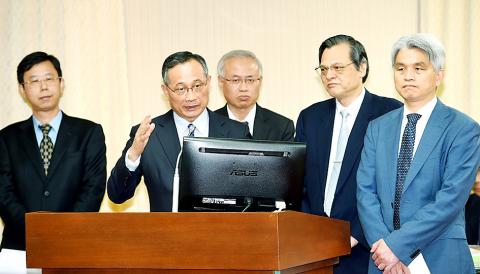The Ministry of Justice’s Investigation Bureau is investigating 33 cases of alleged Chinese funding to candidate campaigns for the Nov. 24 elections, bureau Director-General Leu Wen-jong (呂文忠) said yesterday.
Asked by Chinese Nationalist Party (KMT) caucus deputy secretary-general William Tseng (曾銘宗) during a meeting of the legislature’s Internal Administration Committee whether the suspect funds were coming directly from the Chinese government or affiliated organizations, Leu said: “You could say that.”
Many of the cases involved donations made through Taiwanese businesses in China, Leu said.

Photo: Fang Pin-chao, Taipei Times
When Tseng asked if any of the donations could have simply been made by those businesses, without Chinese help, Leu said the bureau has evidence that China is attempting to influence the elections by funding certain candidates and is preparing cases for prosecution.
If Taiwanese businesses were making the donations on their own, they would be legal, but the Political Donations Act (政治獻金法) and the Act Governing Relations Between the People of the Taiwan Area and the Mainland Area (台灣地區與大陸地區人民關係條例) prohibit donations made by Chinese individuals or entities, Leu said.
China has been attempting to circumvent these laws by making donations in other ways, such as through China-based Taiwanese businesses, with the money coming from China’s Taiwan Affairs Office, he said.
Four cases that are being investigated by prosecutors in Taipei and Changhua, Yunlin and Pingtung counties are being treated as alleged vote-buying, the bureau said.
Leu said Beijing had also invited some influential community leaders to visit China on all-expenses-paid trips in return for their backing of China’s favored candidates, but he would not give more details when pressed by committee members.
The bureau has identified certain candidates it believes are being funded by Beijing and it is building cases against them, he added.
The Taiwan High Prosecutors’ Office has conducted raids on two underground money exchanges, he said.
The raids were part of preparations for next month’s meeting of the Asia/Pacific Group on Money Laundering and aimed at cracking down on campaign violations, as some money meant to influence the elections has been flowing into the exchanges from China, he said.
Mainland Affairs Council Minister Chen Ming-tong (陳明通) told the committee that the council was already looking into the cases, but needed more specific information from the bureau.
Meanwhile, Minister of Justice Tsai Ching-hsiang (蔡清祥) called on the police to step up measures against foreign interference in next month’s elections.
Additional reporting by CNA

Conflict with Taiwan could leave China with “massive economic disruption, catastrophic military losses, significant social unrest, and devastating sanctions,” a US think tank said in a report released on Monday. The German Marshall Fund released a report titled If China Attacks Taiwan: The Consequences for China of “Minor Conflict” and “Major War” Scenarios. The report details the “massive” economic, military, social and international costs to China in the event of a minor conflict or major war with Taiwan, estimating that the Chinese People’s Liberation Army (PLA) could sustain losses of more than half of its active-duty ground forces, including 100,000 troops. Understanding Chinese

The Ministry of Foreign Affairs (MOFA) yesterday said it is closely monitoring developments in Venezuela, and would continue to cooperate with democratic allies and work together for regional and global security, stability, and prosperity. The remarks came after the US on Saturday launched a series of airstrikes in Venezuela and kidnapped Venezuelan President Nicolas Maduro, who was later flown to New York along with his wife. The pair face US charges related to drug trafficking and alleged cooperation with gangs designated as terrorist organizations. Maduro has denied the allegations. The ministry said that it is closely monitoring the political and economic situation

‘SLICING METHOD’: In the event of a blockade, the China Coast Guard would intercept Taiwanese ships while its navy would seek to deter foreign intervention China’s military drills around Taiwan this week signaled potential strategies to cut the nation off from energy supplies and foreign military assistance, a US think tank report said. The Chinese People’s Liberation Army (PLA) conducted what it called “Justice Mission 2025” exercises from Monday to Tuesday in five maritime zones and airspace around Taiwan, calling them a warning to “Taiwanese independence” forces. In a report released on Wednesday, the Institute for the Study of War said the exercises effectively simulated blocking shipping routes to major port cities, including Kaohsiung, Keelung and Hualien. Taiwan would be highly vulnerable under such a blockade, because it

UNRELENTING: China attempted cyberattacks on Taiwan’s critical infrastructure 2.63 million times per day last year, up from 1.23 million in 2023, the NSB said China’s cyberarmy has long engaged in cyberattacks against Taiwan’s critical infrastructure, employing diverse and evolving tactics, the National Security Bureau (NSB) said yesterday, adding that cyberattacks on critical energy infrastructure last year increased 10-fold compared with the previous year. The NSB yesterday released a report titled Analysis on China’s Cyber Threats to Taiwan’s Critical Infrastructure in 2025, outlining the number of cyberattacks, major tactics and hacker groups. Taiwan’s national intelligence community identified a large number of cybersecurity incidents last year, the bureau said in a statement. China’s cyberarmy last year launched an average of 2.63 million intrusion attempts per day targeting Taiwan’s critical